This is the third blogpost in the series looking at the women that Diodorus wrote about, following our reading of the history of Alexander the Great in Diodorus’s Library[1] for the Kosmos Society Book Club in the summer of 2023. I extended my reading to Plutarch[2] and Arrian[3] to get a wider picture of Alexander’s life. The first blogpost described some of the social and religious contexts of the time, and the second described aspects of the lives of women associated with Philip of Macedon. Both blogposts revealed the importance of the inheritance of political power at that time. I now turn to women in the life of Alexander the Great, who lived from 356 BCE – 323 BCE. His parents were Philip II of Macedon, who had established the Macedonian Empire in the fourth century BCE, and his fourth wife, Olympias, a Princess of Epirus. Alexander was named after her father.
Following the assassination of Philip of Macedon, Alexander embarked on a series of military campaigns that were intended to consolidate the Macedonian Empire, and extend it into Persia. This was partly seen as revenge for the Persian invasion of Greece some 150 years earlier. Alexander was called ‘The Great’ presumably because of his military success, and he was no doubt a clever military commander. My analysis brings out some other aspects of his personality, particularly his drunkenness, his religious motivation, and also his ambivalent attitudes to women. Like his father, he was polygamous, and he had three wives, and one particularly famous sexual alliance with an Amazon Queen. He also had a bizarre habit of adopting himself to various powerful people whom he met on his journeys.
First, we should consider the women involved in Alexander’s childhood. His mother, Olympias, was possibly a strong influence on it, because she continued to try to influence him, by letter, as he travelled through Asia, as described in Blogpost 2. Arrian tells a story, though, that reveals the identity of Alexander’s nurse, Lanice. Alexander, and Lanice’s brother, Clitus, got into a drunken brawl after Clitus had insulted Alexander by suggesting he was not a great hero like his father. Alexander killed Clitus with a pike.

I think Clitus deserving of severe censure for his insolent behaviour to his king, while at the same time I pity Alexander for his mishap, because on that occasion he showed himself the slave of two vices, anger and drunkenness, by neither of which is it seemly for a prudent man to be enslaved. But then on the other hand I think his subsequent behaviour worthy of praise, because directly after he had done the deed he recognised that it was a horrible one. Some of his biographers even say that he propped the pike against the wall with the intention of falling upon it himself, thinking that it was not proper for him to live who had killed his friend when under the influence of wine. Most historians do not mention this, but say that he went off to bed and lay there lamenting, calling Clitus himself by name, and his sister Lanice, daughter of Dropidas, who had been his nurse. He exclaimed that having reached man’s estate he had forsooth bestowed on her a noble reward for her care in rearing him, as she lived to see her own sons die fighting on his behalf, and the king slaying her brother with his own hand. [4]
Another woman from Alexander’s childhood was Cleopatra, his full sister (not to be confused with other Cleopatras, whose stories were told in Blogpost 2). Alexander’s sister Cleopatra married her uncle, Alexander of Epirus, Olympias’s brother. After his death she attempted to make a political marriage to Perdiccas, a former general of Alexander engaged in the wars of succession. However, Perdiccas preferred another women called Nicaea, leaving Cleopatra to seek a marriage with another former general, Ptolemy, in Egypt:
Meanwhile Cleopatra quarrelled with Antigonus and, inclining to cast her lot with Ptolemy, she started from Sardis in order to cross over to him. She was the sister of Alexander the conqueror of Persia and daughter of Philip, son of Amyntas, and had been the wife of the Alexander who made an expedition into Italy. Because of the distinction of her descent Cassander and Lysimachus, as well as Antigonus and Ptolemy and in general all the leaders who were most important after Alexander’s death, sought her hand; for each of them, hoping that the Macedonians would follow the lead of this marriage, was seeking alliance with the royal house in order thus to gain supreme power for himself. The governor of Sardis, who had orders from Antigonus to watch Cleopatra, prevented her departure; but later, as commanded by the prince, he treacherously brought about her death through the agency of certain women. But Antigonus, not wishing the murder to be laid at his door, punished some of the women for having plotted against her, and took care that the funeral should be conducted in royal fashion. Thus Cleopatra, after having been the prize in a contest among the most eminent leaders, met this fate before her marriage was brought to pass.[5]
This story both illustrates the way marriage was used politically, and it suggests that Cleopatra was an active participant in the political decisions being made. She wanted to marry Perdiccas, and she sought marriage with Ptolemy. She was not entirely a pawn here, but she was taking active political decisions, albeit with tragic results.
Returning now to Alexander, one of his characteristics was his belief in gods and oracles. At the beginning of his journey he visited the sanctuary of Athena in the Troad before leaving[6]. He laid siege to Tyre because he wanted to worship Heracles there[7]. He also visited shrines at Didyma, Heliopolis, and Memphis. After Egypt had surrendered to him, Alexander travelled to the sanctuary of Ammon at Siwa in the Egyptian desert. Here, he declared himself son of the priest:

When Alexander was conducted by the priests into the temple and had regarded the god for a while, the one who held the position of prophet, an elderly man, came to him and said, “Rejoice, son, take this form of address as from the god also.” He replied, “I accept, father; for the future I shall be called thy son.” [8]
I wondered about the meaning of this. In the 1990s the British historian Michael Wood produced a TV series, In the Footsteps of Alexander the Great, and an accompanying book[9]. Wood travelled, as far as possible, the route that Alexander took, and he did not hesitate to tell what he found about Alexander. Wood described this ‘adoption’ as a ‘slip’, and ‘possibly a literary embellishment’.[10] However, whilst this is the first time that Alexander adopted himself to someone, we shall see other examples, such as Ada of Caria in the next Blogpost, so this may be a pattern. He already had powerful biological parents. In this instance, Alexander seems to declare himself the son of god. In our Kosmos Book Club discussion Ian wondered if these visits to shrines constituted myth making rather than religious feeling.
The next women we meet in the Alexander story are the family of Darius, King of Persia, which consisted of Darius’s mother, Sisyngambris, his sister/wife, Stateira, and her daughters, another Stateira and Drypetis, along with a son, Ochus. Philip’s wives remained in Macedon when he was campaigning, but Alexander and Darius seemed to take women with them on their travels. After Alexander had defeated Darius at the Battle of Issus, his army went on the rampage and abducted Darius’s family, as described by Diodorus in some detail:
When night fell, the remainder of the Persian army easily succeeded in scattering in various directions while the Macedonians gave over the pursuit and turned to plunder, being particularly attracted by the royal pavilions because of the mass of wealth that was there. This included much silver, no little gold, and vast numbers of rich dresses from the royal treasure, which they took, and likewise a great store of wealth belonging to the King’s Friends, Relatives, and military commanders. Not only the ladies of the royal house but also those of the King’s Relatives and Friends, borne on gilded chariots, had accompanied the army according to an ancestral custom of the Persians, and each of them had brought with her a store of rich furniture and feminine adornment, in keeping with their vast wealth and luxury. The lot of these captured women was pathetic in the extreme. They who previously from daintiness only with reluctance had been conveyed in luxurious carriages and had exposed no part of their bodies unveiled now burst wailing out of the tents clad only in a single chiton, rending their garments, calling on the gods, and falling at the knees of the conquerors. Flinging off their jewelry with trembling hands and with their hair flying, they fled for their lives over rugged ground and, collecting into groups, they called to help them those who were themselves in need of help from others. Some of their captors dragged these unfortunates by the hair, others, ripping off their clothing, drove them with blows of their hands or spear-butts against their naked bodies, thus outraging the dearest and proudest of the Persian possessions by virtue of Fortune’s generosity to them.[11]
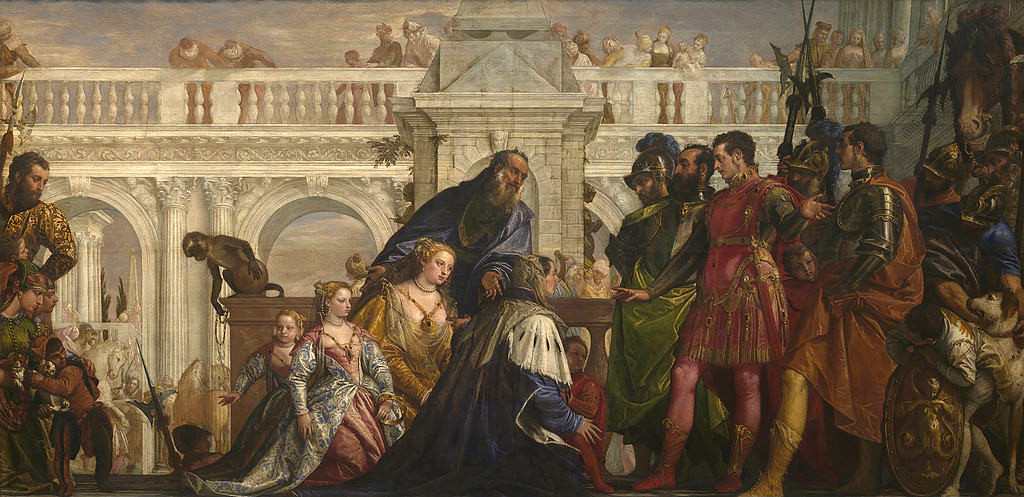
Alexander, however, chose to treat Darius’s family with respect:
So at daybreak, the king took with him the most valued of his Friends, Hephaestion, and came to the women. They both were dressed alike, but Hephaestion was taller and more handsome. Sisyngambris took him for the king and did him obeisance. As the others present made signs to her and pointed to Alexander with their hands she was embarrassed by her mistake, but made a new start and did obeisance to Alexander. He, however, cut in and said, “Never mind, Mother. For actually he too is Alexander.” By thus addressing the aged woman as “Mother,” with this kindliest of terms he gave the promise of coming benefactions to those who had been wretched a moment before. Assuring Sisyngambris that she would be his second mother he immediately ratified in action what he had just promised orally. He decked her with her royal jewelry and restored her to her previous dignity, with its proper honours. He made over to her all the former retinue of servants which she had been given by Dareius and added more in addition not less in number than the preceding. He promised to provide for the marriage of the daughters even more generously than Dareius had promised and to bring up the boy as his own son and to show him royal honour. He called the boy to him and kissed him, and as he saw him fearless in countenance and not frightened at all, he remarked to Hephaestion that at the age of six years the boy showed a courage beyond his years and was much braver than his father. As to the wife of Dareius, he said that he would see that her dignity should be so maintained that she would experience nothing inconsistent with her former happiness. He added many other assurances of consideration and generosity, so that the women broke out into uncontrolled weeping, so great was their unexpected joy. He gave them his hand as pledge of all this and was not only showered with praises by those who had been helped, but won universal recognition throughout his own army for his exceeding propriety of conduct[12].
This story is significant for a number of reasons. First, Diodorus used it to show Alexander’s apparent compassion. However, he had shown little compassion for the women raped and robbed by his army, and the treatment of Darius’s wife may not have been as gracious as this suggests, because Plutarch reported that she died two years later in childbirth[13]. Second, he called Sisyngambris ‘Mother’, so she is another of the people, men and women, that Alexander adopted himself to on his campaigns. Diodorus said that, after Alexander’s death, Sisyngambris
. . . mourned his passing and her own bereavement, and coming to the limit of her life she refrained from food and died on the fifth day, abandoning life painfully but not ingloriously[14][.]
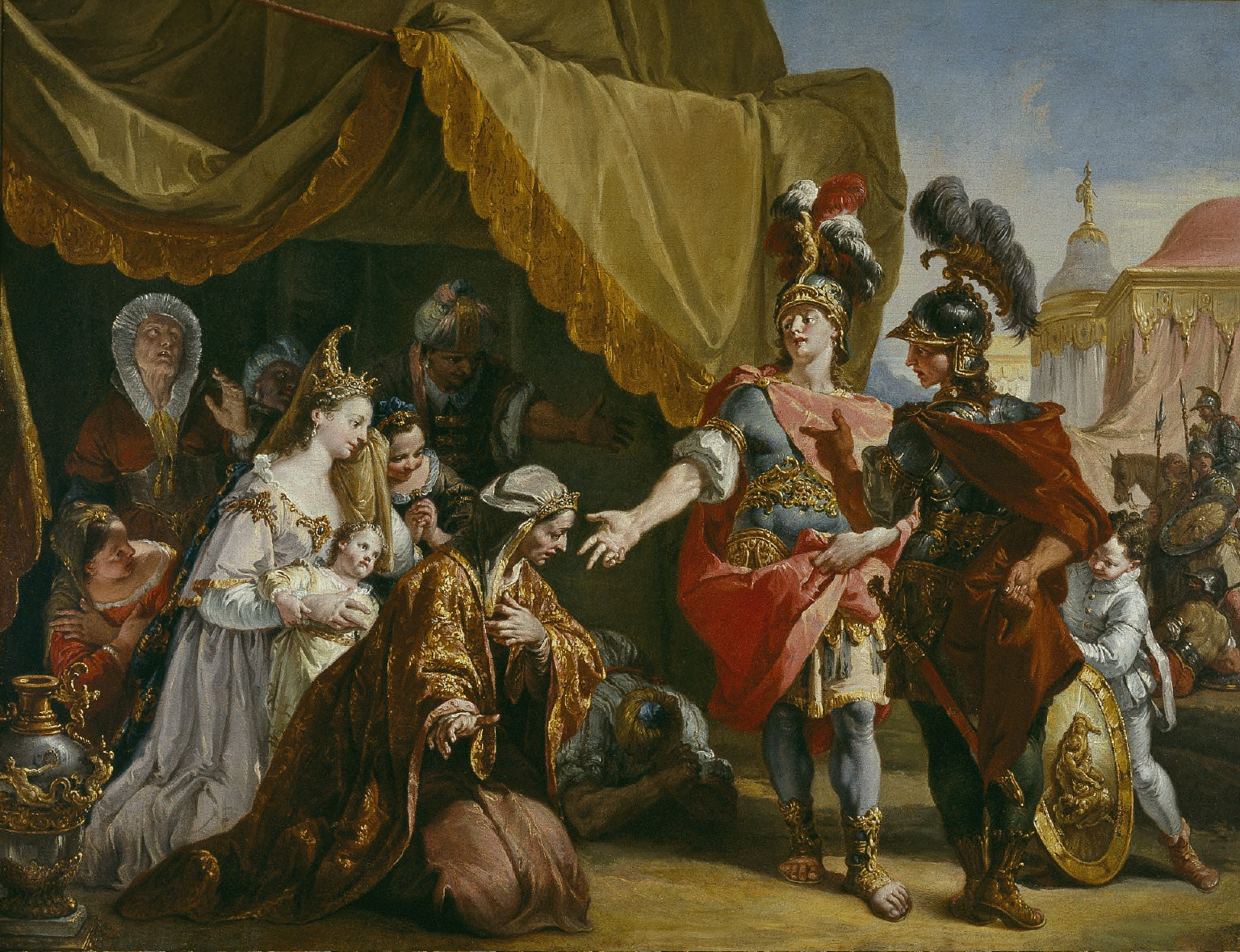
Third the Sisyngambris story is a story often told to illustrate the closeness of Alexander and Hephaistion, that Alexander perceived them as one person.
We now return to Alexander’s campaigns. When Michael Wood travelled in Alexander’s footsteps he encountered oral folk story tellers who still tell of the hatred and fear Alexander engendered:
A hero he may be to generations in the west, but to the people of Asia, the Persians, Central Asians and Indians, he is a bringer of death[15].
On his travels, Alexander met Barsine, a woman who now has a contested identity. She seems to have been the wife of Memnon of Rhodes, who was defending himself against the Persians. Memnon sent her to Darius as a political gesture, and she was captured by Alexander, with whom she had a son, Heracles, who died young. Plutarch described her in the context of Alexander’s capture of the Darius’s family:
But Alexander, as it would seem, considering the mastery of himself a more kingly thing than the conquest of his enemies, neither laid hands upon these women, nor did he know any other before marriage, except Barsiné. This woman, Memnon’s widow, was taken prisoner at Damascus. And since she had received a Greek education, and was of an agreeable disposition, and since her father, Artabazus, was son of a king’s daughter, Alexander determined (at Parmenio’s instigation, as Aristobulus says) to attach himself to a woman of such high birth and beauty.[16]
Barsine travelled with Olympias at one point, but she eventually met her death, with her son, during the wars of succession.
Alexander’s compassion towards some women is illustrated in the story of Telesippa, although only because she was born free:
When he was sending home his aged and infirm soldiers, Eurylochus of Aegae got himself enrolled among the sick, and then, when it was discovered that he had nothing the matter with him, confessed that he was in love with Telesippa, and was bent on following along with her on her journey to the sea-board. Alexander asked of what parentage the girl was, and on hearing that she was a free-born courtesan, said: ‘I will help you, O Eurylochus, in your amour; but see to it that we try to persuade Telesippa either by arguments or by gifts, since she is free-born.’[17]
One of the better known events during Alexander’s campaign was the burning of Persepolis, described here by Diodorus, and involving the participation of a courtesan named Thais:
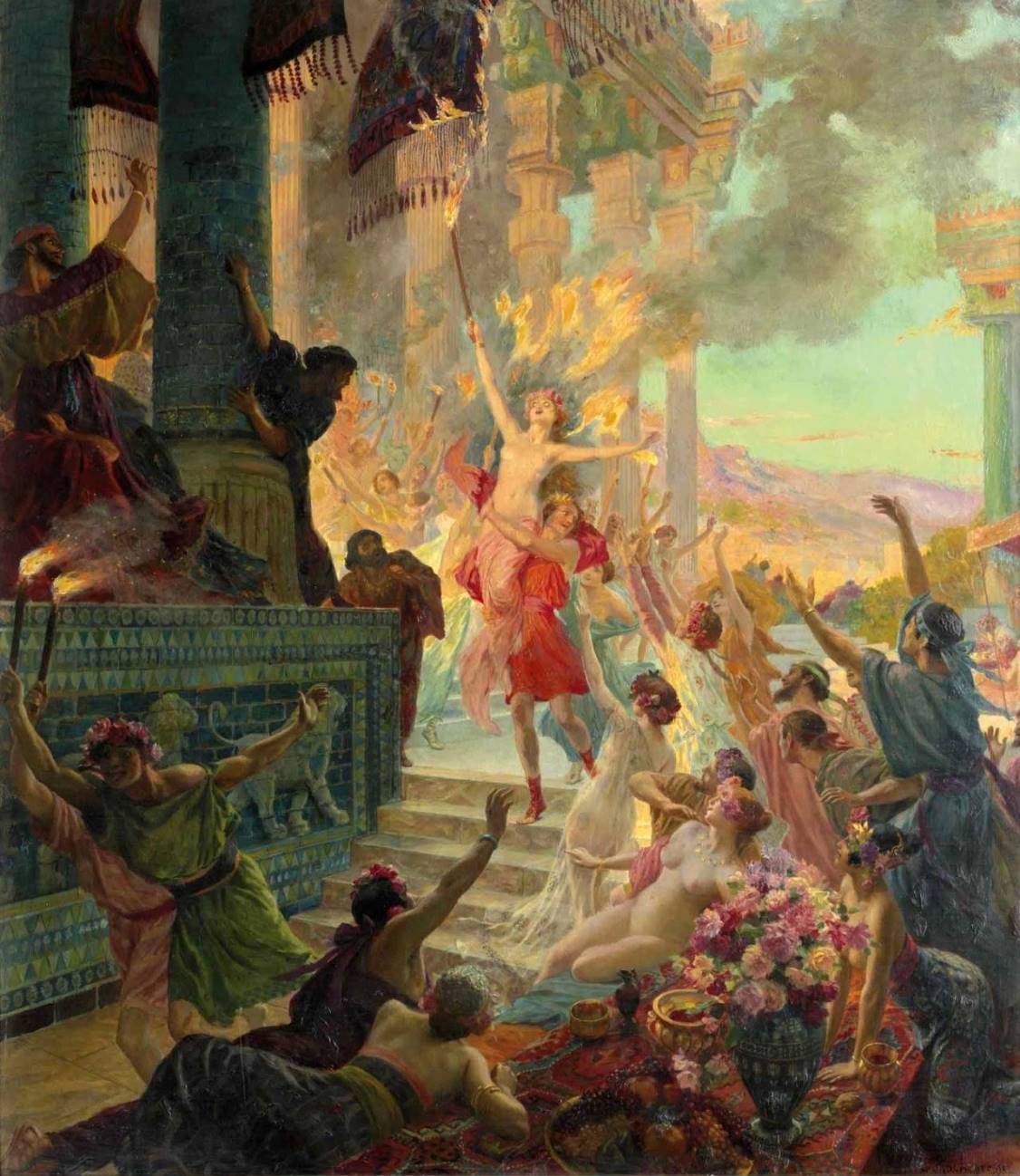
While they were feasting and the drinking was far advanced, as they began to be drunken a madness took possession of the minds of the intoxicated guests. At this point one of the women present, Thais by name and Attic by origin, said that for Alexander it would be the finest of all his feats in Asia if he joined them in a triumphal procession, set fire to the palaces, and permitted women’s hands in a minute to extinguish the famed accomplishments of the Persians. This was said to men who were still young and giddy with wine, and so, as would be expected, someone shouted out to form the comus and to light torches, and urged all to take vengeance for the destruction of the Greek temples. Others took up the cry and said that this was a deed worthy of Alexander alone. When the king had caught fire at their words, all leaped up from their couches and passed the word along to form a victory procession in honour of Dionysus. Promptly many torches were gathered. Female musicians were present at the banquet, so the king led them all out for the comus to the sound of voices and flutes and pipes, Thais the courtesan leading the whole performance. She was the first, after the king, to hurl her blazing torch into the palace. As the others all did the same, immediately the entire palace area was consumed, so great was the conflagration. It was most remarkable that the impious act of Xerxes, king of the Persians, against the acropolis at Athens should have been repaid in kind after many years by one woman, a citizen of the land which had suffered it, and in sport[18]
In a note to this passage in his own translation, Waterfield[19] suggests that this story is probably untrue. He notes that excavation has shown that the palaces were stripped of their contents before being fired, suggesting an organised destruction rather than the result of a drunken brawl[20]. I wondered why, then, Diodorus had attributed the event to a woman. Perhaps both interpretations could be true, and she organised a planned robbery and destruction.
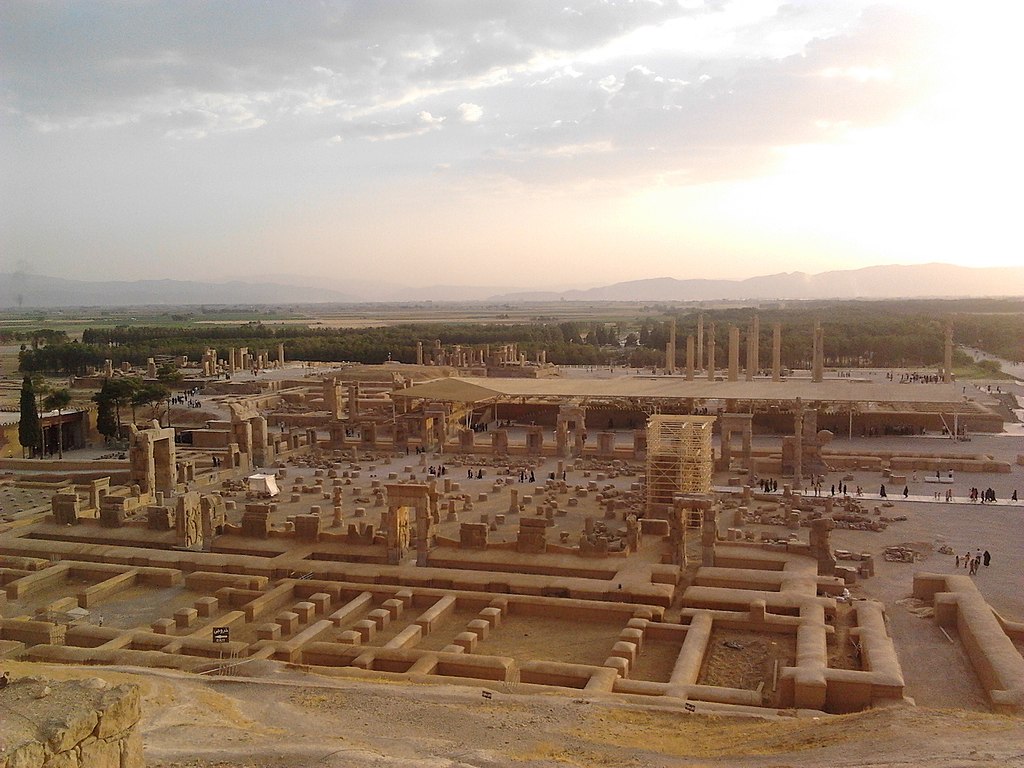
There is little doubt that the love of Alexander’s life was Hephaistion, and their relationship is attested in a number of anecdotes. However, Arrian also tells of his love for a woman, Roxanne of Bactria, whom he married after taking the Sogdian Rock:

This chief [Oxyartes] had a daughter, a maiden of marriageable age, named Roxana, who was asserted by the men who served in Alexander’s army to have been the most beautiful of all Asiatic women, with the single exception of the wife of Darius. They also say that no sooner did Alexander see her than he fell in love with her; but though he was in love with her, he refused to offer violence to her as a captive, and did not think it derogatory to his dignity to marry her. This conduct of Alexander I think worthy rather of praise than blame[21]
Alexander and Roxanne had a son, also Alexander, and during the wars of succession Roxanne traveled to Epirus with Olympias for protection. However, she and her son suffered an early death at the hands of one of Alexander’s former generals. Diodorus told clearly that what happened when patrilineal inheritance failed, the world turned to war:
Now Cassander perceived that Alexander, the son of Roxanê, was growing up and that word was being spread throughout Macedonia by certain men that it was fitting to release the boy from custody and give him his father’s kingdom; and, fearing for himself, he instructed Glaucias, who was in command of the guard over the child, to murder Roxanê and the king and conceal their bodies, but to disclose to no one else what had been done. When Glaucias had carried out the instructions, Cassander, Lysimachus, and Ptolemy, and Antigonus as well, were relieved of their anticipated danger from the king; for henceforth, there being no longer anyone to inherit the realm, each of those who had rule over nations or cities entertained hopes of royal power and held the territory that had been placed under his authority as if it were a kingdom won by the spear[22]
Towards the end of his campaigns, Alexander was again in Susa, where there appears to have been a great marriage festival:
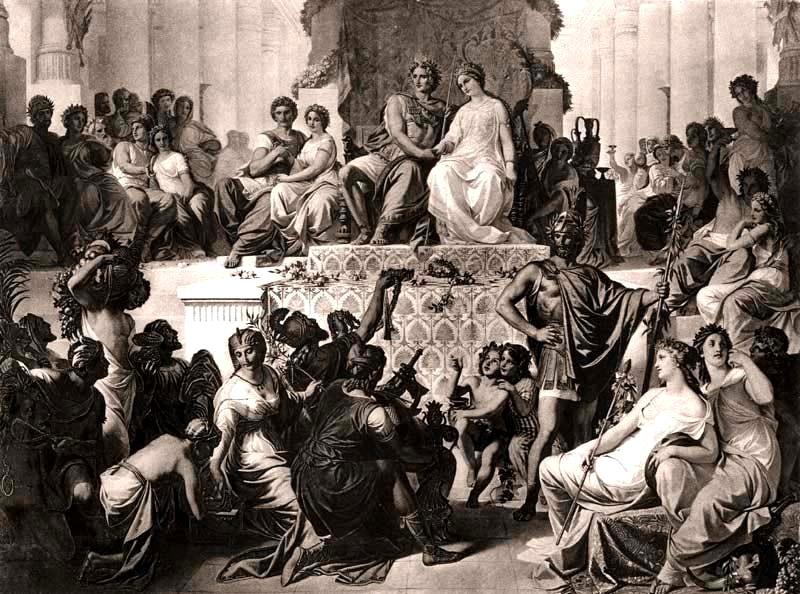
At Susa he brought to pass the marriage of his companions, took to wife himself the daughter of Dareius, Stateira, assigned the noblest women to his noblest men, and gave a general wedding feast for those of his Macedonians who had already contracted other marriages. At this feast, we are told, nine thousand guests reclined at supper, to each of whom a golden cup for the libations was given. All the other appointments too, were amazingly splendid, and the host paid himself the debts which his guests owed, the whole outlay amounting to nine thousand eight hundred and seventy talents[23].
Diodorus reported that Hephaistion married Darius’s other daughter, Drypetis[24]. It is interesting that Alexander had the power to ‘assign’ certain women to certain men. Authorities debate the significance of these marriages. Some suggest that they were annulled immediately after the death of Alexander, while others contest this. Plutarch saw the marriages as politically unifying:
I would gladly have been a witness of that fair and holy marriage-rite, when [Alexander] brought together in one golden-canopied tent an hundred Persian brides and an hundred Macedonian and Greek bridegrooms, united at a common hearth and board. He himself, crowned with garlands, was the first to raise the marriage hymn as though he were singing a song of truest friendship over the union of the two greatest and most mighty peoples; for he, of one maid the bridegroom, and at the same time of all the brides the escort, as a father and sponsor united them in the bonds of wedlock. Indeed at this sight I should have cried out for joy, “O dullard Xerxes, stupid fool that spent so much fruitless toil to bridge the Hellespont! This is the way that wise kings join Asia with Europe; it is not by beams or rafts, nor by lifeless and unfeeling bonds, but by the ties of lawful love and chaste nuptials and mutual joy in children that they join the nations together.”[25]
Wood suggested that the purposes of the marriages were
To create a new ruling class in Iran whose loyalties lay there, not back in Macedonia. The mass marriage has been remembered with bitterness down to the present day Zoroastrians in Iran, where it is commonly said that the hated Alexander ‘forced out boys and girls to marry against their will . . Provisions were also made for the education of no less than 10,000 children born to the troops by captive women during the expedition[26].
The story also contests the idea that the Macedonians were monogamous, which has been suggested by some[27].
The final woman in this Blogpost is Thallestris, Queen of Amazons, who apparently asked that Alexander father a child with her:
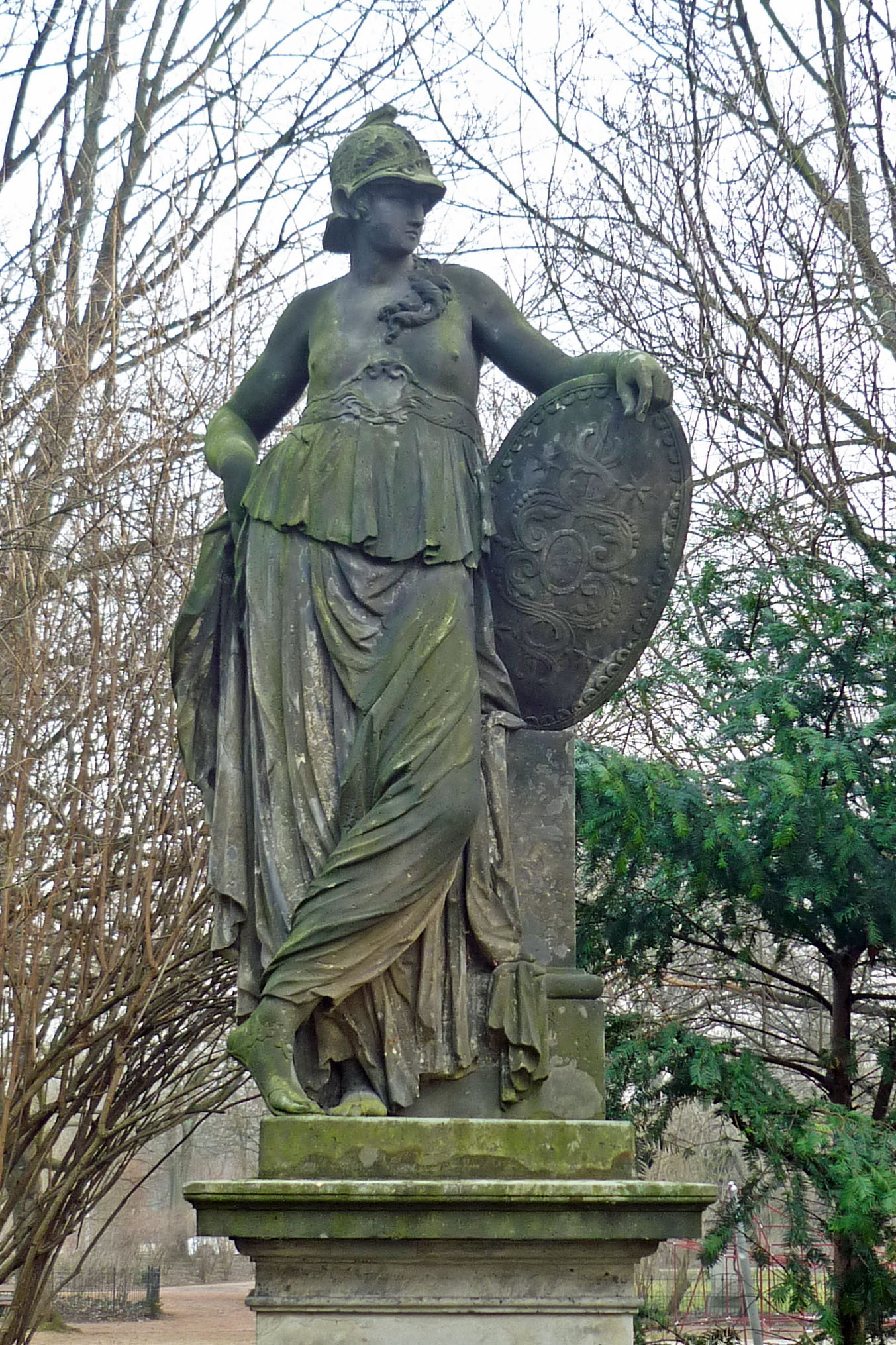
When Alexander returned to Hyrcania, there came to him the queen of the Amazons named Thallestris, who ruled all the country between the rivers Phasis and Thermodon. She was remarkable for beauty and for bodily strength, and was admired by her countrywomen for bravery. She had left the bulk of her army on the frontier of Hyrcania and had arrived with an escort of three hundred Amazons in full armour. The king marvelled at the unexpected arrival and the dignity of the women. When he asked Thallestris why she had come, she replied that it was for the purpose of getting a child. He had shown himself the greatest of all men in his achievements, and she was superior to all women in strength and courage, so that presumably the offspring of such outstanding parents would surpass all other mortals in excellence. At this the king was delighted and granted her request and consorted with her for thirteen days, after which he honoured her with fine gifts and sent her home[28].
Plutarch doubted this story, but gave a list of authorities who believed or disbelieved it[29]. Some, apparently, did not believe that Amazons existed. I find it interesting that a story featuring a powerful and assertive woman is disbelieved, while other stories, some involving premonitions or supernatural events, are believed without question. Like the Spartans, Amazons left no written record, but archaeological evidence of powerful women is now emerging, supported by DNA analysis[30]. Mayor details the arguments, and concludes:
The written accounts of Alexander’s encounters with Amazons were debated in antiquity and took on the trappings of legend. But the consistent realistic detail in those stories and the continuing discussions about their truth in antiquity provide fascinating evidence of just how deeply embedded the prickly, enticing idea of Amazons was for the Greeks. That a bold, adventurous man might hope to find a companion in an equally strong women of action was a perennially thrilling prospect[31].
My analysis of women in the life of Alexander the Great has emphasised a number of themes. Concerning Alexander, we see a man who was religious, often drunk, driven and ambitious, cruel and compassionate, probably bisexual, with ambitions to be the son of a god, travelling from religious sanctuary to sanctuary and taking them with military genius. Life for ordinary women, in the context of an invading army, was brutal. They were raped, robbed and enslaved. For aristocratic women, the story was slightly different. They were often treated with respect, but they could be married apparently at Alexander’s whim. In Blogpost 2, concerning the wives of Philip of Macedon, we saw some women fighting back, and here we saw Alexander’s sister Cleopatra taking her own decisions. But there are no women fighting against Alexander, perhaps because Alexander was a charismatic character. After all, he persuaded an army to campaign in difficult terrain for many years. He seemed to win women over, and he was able to treat them with compassion when he chose to. He adopted some as his mother, he treated Sisyngambris, Telesippa and Roxanne with respect, and he acceded to the wishes of the powerful Amazon Thallestris. I suggest that he saw his victories coming from warfare in preference to political marriage alliances with aristocratic women. I am not sure which was the better moral choice. In Blogpost 4 I shall explore the lives of some of the other women Diodorus described and attempt to draw some conclusions.
Related posts
Women in Diodorus Siculus | part 1: Introduction and Contexts
Women in Diodorus Siculus | part 2: Women Associated with Philip II of Macedon
Women in Diodorus Siculus | part 4: More Women, and Conclusions
Notes
1 Diodorus Siculus. Library, in Twelve Volumes with an English Translation by C. H. Oldfather. Vol. 4-8. Cambridge, Mass.: Harvard University Press; London: William Heinemann, Ltd. 1989.
Books 16, 17: Online at Perseus
Books 18, 19, 20: Online at LacusCurtius
References are to book number, then chapter number, then section
2 Plutarch, Alexander. Bernadotte Perrin, Ed.
Online at Perseus
References are to chapter number and section number.
3 Arrian Anabasis. Translated by E.J.Chinnock
Online at Project Gutenberg
References are to book number, then chapter number, then section
9 Wood, Michael (1997) In the Footsteps of Alexander the Great: a Journey from Greece to Asia. London: BBC Books.
10 Wood, op cit. p.75.
15 Wood, op cit, p. 237
19 Waterfield, Robin (2019) Diodorus of Sicily: The Library, Books 16–20. Oxford. Oxford University Press
20 Waterfield (2019) p. 462. n.72.6
25 Plutarch The First oration: On the Fortune or Virtue of Alexander the Great, 1.7, Translated by Frank Cole Babbitt (1936)
Online at LacusCurtius
26 Wood, op cit, 218
27 Branko F. van Oppen de Rutter (2014). The Susa marriages: a historiographical note. Ancient Society, 44, 25–41
30 Mayor, Adrienne. (2014) The Amazons: Lives and legends of Warrior Women across the Ancient World. Princeton: Princeton University Press.
31 Mayor (2014) p.338
Online texts retrieved December 2023
Image credits
The Quarrel between Alexander and Clitus
Illustration to Plutarch’s lives for boys and girls: being selected lives freely retold by W.H. Weston, Illustrated by W. Rainey, 1900
Public domain, via Wikimedia Commons
Alexander the Great called the son of Jupiter-Ammon by the priest at the oracle in the Siwa oasis. 1696.
Public domain, via Wikimedia Commons
Paolo Veronese: The Family of Darius before Alexander (1565)
Public domain, Google Art Project, via Wikimedia Commons
Francesco Fontebasso: Family of Darius Before Alexander (1750)
Public domain, via Wikimedia Commons
Georges-Antoine Rochegrosse: The Burning of Persepolis, 1890
Public domain, via Wikimedia Commons
Il Sodoma: The Wedding of Alexander the Great and Roxane, c 1517
Public domain, via Wikimedia Commons
Persepolis
Photo: F Couin. Creative Commons Attribution-Share Alike 4.0 International license, via Wikimedia Commons
The weddings at Susa. Late 19th century engraving (no further source given)
Public domain, via Wikimedia Commons
Thaddäus Ignatius Wiskotschill (1753–1795): Sculpture of Thalestris in the Bürgerwiese in Dresden
Photo: SchiDD. Creative Commons Attribution-Share Alike 3.0 Unported license, via Wikimedia Commons
Note: Images have been selected from pictures that are freely available with open source or Creative Commons licenses or from photographs sent in by community members for the purpose. The images in this post are intended to suggest the subject, rather than illustrate exactly—as such, they may be from other periods, subjects, or cultures. Attributions are based where possible by those shown by galleries or museums, or on Wikimedia Commons or Flickr, at the time of publication on this website.
Images retrieved December 2023
___
Anne Spendiff is a member of Kosmos Society